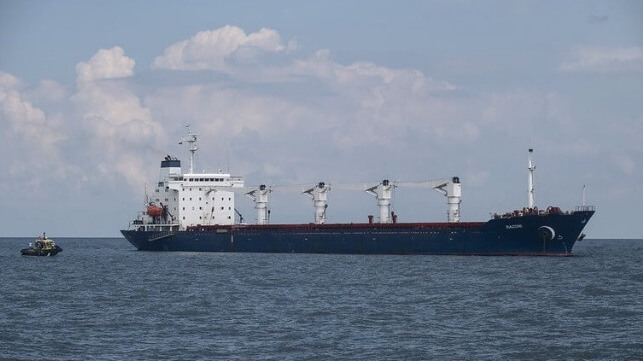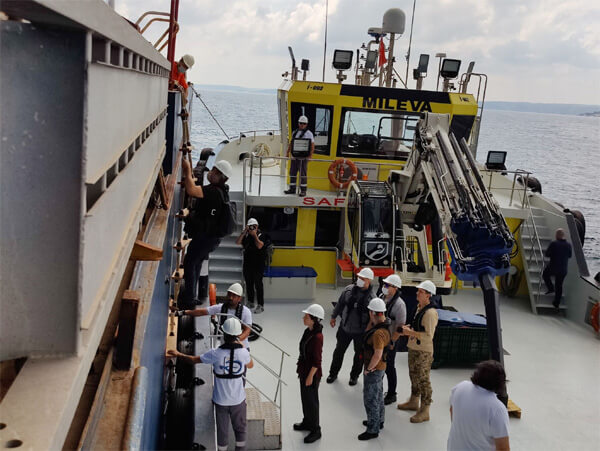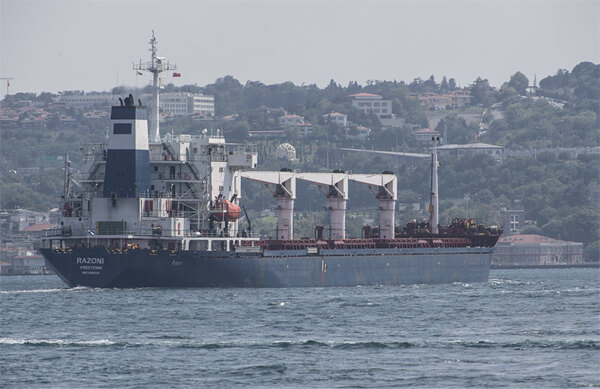Bulker Carrying Ukrainian Grain Clears Inspection, Raising Hopes

The first bulker transporting a cargo of corn from Ukraine cleared an inspection and is now free to continue on its voyage to Lebanon. International leaders hailed the development as a critical “proof of concept” for the UN-brokered agreement to restart shipments of grain from Ukraine for the next 120 days.
The bulker, the Razoni (29,292 dwt) registered in Sierra Leone was delayed by bad weather but otherwise reported an uneventful crossing of the Black Sea. It had been guided out of the Port of Odesa on August 1 by Ukrainian pilots and a harbor vessel to pass the mines at the harbor’s entrance. Heavy seas delayed the expected arrival from mid-day on Tuesday to the evening, and she then anchored awaiting the inspection.
The Joint Coordination Center in Istanbul issued a statement reporting that a team consisting of inspectors from Russia, Ukraine, Turkey, and the United Nations boarded the ship this morning. “The team carried out a three-hour inspection and confirmed that crew and cargo are as authorized and consistent with the information the JCC received before the vessel sailed from Odesa.”
The inspection team also had discussions with the crew of the Razoni about the process and the voyage. After clearing the vessel, they reported “The JCC will use this voyage in its ongoing work on fine-tuning procedures and processes to enable the continuation of safe passage of commercial vessels across the Black Sea under the Initiative.”
AIS data shows that the Razoni anchored off Istanbul after being permitted by the inspectors to depart and transit the Bosphorus. The Ukrainian ambassador to Lebanon is reporting that the vessel will begin unloading in Tripoli within the next four to five days.

Inspection team boarding the bulker anchored north of Turkey (Turkish Defense Ministry)
A spokesman for the UN said are hopeful that the smooth process will provide additional assurance to the shipping and global community so that more grain and related products can move on a regular basis from the three Ukrainian ports covered by the agreement. Earlier reports said that they were hoping to move at least 5 million tonnes of grain a month under the agreement and they have expressed confidence that the agreement can be extended beyond its initial period.
Ukrainian officials reported today that 17 additional vessels are loaded and ready to depart now that the process has been successfully demonstrated. Also expressing confidence, a Turkish official speaking to Reuters suggested that the number of vessels could be increased to three per day instead of one per day. The inbound process however remains to be demonstrated so that additional vessels can reach the Ukrainian ports to continue the exports after the vessel stuck in the ports since February have departed.
The opening of the Black Sea humanitarian corridor will be in addition to the movement of grain by road and rail to the Ukrainian Danube river ports of Reni and Izmail. From there the grain has been traveling to the Romanian port of Constanta, although in smaller volumes than envisioned for the Black Sea ports. There already has also been talk of possibly expanding the agreement to include a fourth Ukrainian Black Sea port.

Razoni passed through the Strait of Istanbul at 15:20 PM local time (Levent Kulu photo courtesy of OCHA)
Ukrainian President Volodymr Zelenskyy acknowledged the first shipment while calling for dramatic increases to help the sagging economy. He said Ukraine needs to export at least 10 million tonnes to urgently address the economic issues and also encourage farmers to complete the current harvest and prepare to plant next season.
The proof of concept of the humanitarian corridor was a critical step to addressing the UN’s warnings of global famine while others are saying it might be a more meaningful step in the war as it enters its sixth month. Speaking on German TV former chancellor Gerhard Schroeder speculated that the grain deal might provide a way out of the conflict as a model for a negotiated solution. Schroeder was in Moscow last week Reuters reports meeting with Russian President Vladimir Putin.
